Nsg 5003 patho quiz 1 Study guides, Class notes & Summaries
Looking for the best study guides, study notes and summaries about Nsg 5003 patho quiz 1? On this page you'll find 23 study documents about Nsg 5003 patho quiz 1.
All 23 results
Sort by
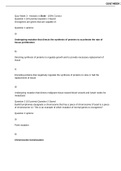
-
NSG 5003 Week 3 Quiz Advanced Patho, LATEST- 2020) ADVANCED PATHOPHYSIOLOGY SOUTH UNIVERSITY, Complete Solution guide. Quiz Week 3 - Answers in Bold - 100% Correct Question 1 (0.5 points) Question 1 Saved Oncogenes are genes that are capable of: Question
- Exam (elaborations) • 12 pages • 2022
-
- $13.99
- + learn more
NSG 5003 Week 3 Quiz Advanced Patho, LATEST- 2020) ADVANCED PATHOPHYSIOLOGY SOUTH UNIVERSITY, Complete Solution guide. Quiz Week 3 - Answers in Bold - 100% Correct Question 1 (0.5 points) Question 1 Saved Oncogenes are genes that are capable of: Question 1 options: a) Undergoing mutation that directs the synthesis of proteins to accelerate the rate of tissue proliferation b) Directing synthesis of proteins to regulate growth and to provide necessary replacement of tissue c) Encoding proteins th...
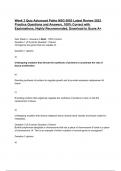
-
Week 3 Quiz Advanced Patho NSG 5003 Latest Review 2023 Practice Questions and Answers, 100% Correct with Explanations, Highly Recommended, Download to Score A+
- Exam (elaborations) • 12 pages • 2023
-
- $6.49
- + learn more
Week 3 Quiz Advanced Patho NSG 5003 Latest Review 2023 Practice Questions and Answers, 100% Correct with Explanations, Highly Recommended, Download to Score A+ Question 1 options: a) Undergoing mutation that directs the synthesis of proteins to accelerate the rate of tissue proliferation b) Directing synthesis of proteins to regulate growth and to provide necessary replacement of tissue c) Encoding proteins that negatively regulate the synthesis of proteins to slow or h...

-
NSG 5003 Week 1 Quiz, NSG5003 Week 2 Patho Quiz, SG5003 Midterm Exam 3, NSG 5003 Midterm Exam, NSG 5003 WEEK 5 QUIZ With Answers, NSG5003 Week 9 Neuro Quiz And NSG 5003 Final Exam Questions and Answers - South University
- Package deal • 7 items • 2022
-
- $22.49
- + learn more
NSG 5003 Week 1 Quiz, NSG5003 Week 2 Patho Quiz, SG5003 Midterm Exam 3, NSG 5003 Midterm Exam, NSG 5003 WEEK 5 QUIZ With Answers, NSG5003 Week 9 Neuro Quiz And NSG 5003 Final Exam Questions and Answers - South University
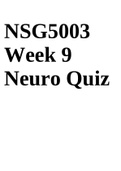
-
NSG 5003 Quiz 1 | NSG5003 Week 2 Patho Quiz | NSG 5003 Midterm Exam | NSG 5003 Week 5 Midterm Questions & Answers & NSG 5003 Week 9 Neuro Quiz.
- Package deal • 6 items • 2022
-
- $35.49
- + learn more
NSG 5003 Quiz 1 | NSG5003 Week 2 Patho Quiz | NSG 5003 Midterm Exam | NSG 5003 Week 5 Midterm Questions & Answers & NSG 5003 Week 9 Neuro Quiz.

-
NSG 5003 Quiz 1 Answers.
- Exam (elaborations) • 16 pages • 2022
- Available in package deal
-
- $11.99
- + learn more
NSG 5003 Quiz 1 Answers. Why is it possible for potassium to diffuse easily into and out of cells? The resting plasma membrane is more permeable to potassium. A major determinant of the resting membrane potential necessary for the transmission of nerve impulses is the ratio between: Intracellular and extracellular K+ What is a consequence of plasma membrane damage to the mitochondria? Influx of calcium ions halts ATP production. Current research supports the belief that after heart ...
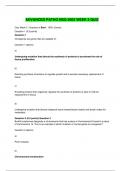
-
ADVANCED PATHO NSG 5003 WEEK 3 QUIZ ANSWERED CORRECTLY
- Exam (elaborations) • 12 pages • 2023
-
- $8.00
- + learn more
ADVANCED PATHO NSG 5003 WEEK 3 QUIZ ANSWERED CORRECTLY Quiz Week 3 - Answers in Bold - 100% Correct Question 1 (0.5 points) Question 1 Oncogenes are genes that are capable of: Question 1 options: a) Undergoing mutation that directs the synthesis of proteins to accelerate the rate of tissue proliferation b) Directing synthesis of proteins to regulate growth and to provide necessary replacement of tissue c) Encoding proteins that negatively regulate the synthesis ...
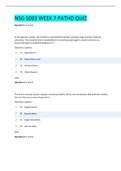
-
NSG 5003 WEEK 7 PATHO QUIZ
- Exam (elaborations) • 3 pages • 2021
-
- $14.49
- + learn more
NSG 5003 WEEK 7 PATHO QUIZ Question 1 (1 point) In the digestive system, the stomach is stimulated by eating to produce large volumes of gastric secretions. The secretion that is responsible for converting pepsinogen to pepsin and acts as a bactericide against swallowed organisms is: Question 1 options: A) Gastroferrin B) Hydrochloric acid C) Intrinsic factor D) Chymotrypsin Save Question 2 (1 point) The enteric nervous system regulates intestinal motility. Of the two movements tha...
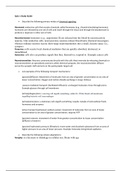
-
NSG 5003 Patho Quiz 1 Study Guide - NSG5003 Pathology South University
- Study guide • 9 pages • 2020
-
- $15.49
- + learn more
Quiz 1 Study Guide ⦁ Describe the following primary modes of chemical signaling: Hormonal: endocrine cells that secrete chemicals called hormones (e.g., thyroid-stimulating hormone); hormones are released by one set of cells and travel through the tissue and through the bloodstream to produce a response in other sets of cells Neurohormonal: hormones (e.g., angiotensin II) are released into the blood by neurosecretory neurons. Like endocrine cells, neurosecretory neurons release blood-borne ch...
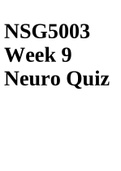
-
NSG 5003: Week 1 Quiz | NSG 5003 Midterm Exam (Complete Questions with Answers) | NSG5003 Week 2 Patho Quiz | NSG 5003 Week 5 Midterm Exam & NSG5003 Week 9 Neuro Quiz
- Package deal • 6 items • 2022
-
- $35.49
- + learn more
NSG 5003: Week 1 Quiz | NSG 5003 Midterm Exam (Complete Questions with Answers) | NSG5003 Week 2 Patho Quiz | NSG 5003 Week 5 Midterm Exam & NSG5003 Week 9 Neuro Quiz

$6.50 for your textbook summary multiplied by 100 fellow students... Do the math: that's a lot of money! Don't be a thief of your own wallet and start uploading yours now. Discover all about earning on Stuvia


